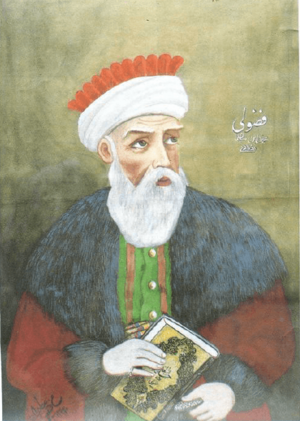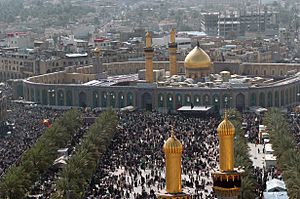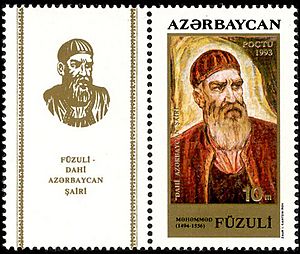Fuzuli (poet) facts for kids
Quick facts for kids
Fuzuli
|
|
|---|---|

Portrait by Azim Azimzade, 1914
|
|
| Born | Muhammad bin Suleyman 1483 |
| Died | 1556 (aged 72–73) |
| Resting place | Karbala |
| Occupation | Poet |
| Language | |
| Notable works | Leyli and Majnun |
| Children | Fazli |
Muhammad bin Suleyman (born 1483–died 1556), better known by his pen name Fuzuli, was a famous poet from the 1500s. He wrote poems in three languages: his native Azerbaijani, Persian, and Arabic. Many people consider him one of the greatest poets in Turkic literature. His work was well-known and loved across a large area, from the Middle East to Central Asia and even India.
Fuzuli was born in 1483 in what is now Iraq. As a child, he studied many subjects, including literature, math, astronomy, and different languages. During his life, the land he lived in was ruled by different empires: first the Aq Qoyunlu, then the Safavid, and later the Ottoman. He wrote poems for leaders in all these empires. He wrote most of his poetry when the Ottomans ruled Iraq.
Even though he had several people who supported his work (called patrons), he never found one that fully satisfied him. He really wanted to join a royal court, but this never happened. He also wished to travel to places like Tabriz, Anatolia, and India, but he never left Iraq. In 1556, Fuzuli died from the plague and was buried in Karbala.
Fuzuli is most famous for his Azerbaijani poems. His best-known work is Leyli and Majnun, which is his version of a sad Middle Eastern love story. He also wrote collections of short poems called divans in Azerbaijani, Persian, and possibly Arabic. His poems are known for showing "intense feelings" and using special symbols and hidden meanings. His writing helped the Azerbaijani language become more refined in classical poetry. Fuzuli is still a very popular poet in countries like Azerbaijan, Turkey, Iran, and Iraq today.
Contents
Fuzuli's Life Story
Fuzuli's real name was Muhammad, and his father's name was Suleyman. He was born in 1483. He chose the pen name Fuzuli, which can mean "presumptuous" or "exalted" and "virtuous." He wrote that he picked this name so he would stand out, believing no one else would choose it. We don't know many details about Fuzuli's life. He was likely a Shia Muslim from the Azerbaijani Turkic group, part of the Bayat tribe.
Some people called him Fuzuli of Baghdad, suggesting he was born or grew up there. Others say he was born in nearby cities like Najaf, Hilla, or Karbala. From a young age, Fuzuli studied literature, math, astronomy, and languages. Besides Azerbaijani, he learned Persian and Arabic early on. He loved poetry since he was a child, finding inspiration from the Azerbaijani poet Habibi.
Fuzuli lived in Iraq when the Aq Qoyunlu dynasty ruled. In 1508, Shah Ismail I of the Iranian Safavid dynasty took control. By then, Fuzuli was already a well-known young poet. He wrote his first known poem for Shah Alvand Mirza of the Aq Qoyunlu. After 1514, a Safavid governor named Ibrahim Khan Mawsillu supported Fuzuli. But when Mawsillu was killed in 1527, Fuzuli lost his supporter. He then moved to Hilla or Najaf, probably because he couldn't find another patron among the Safavid nobles. He worked as a caretaker at the Imam Ali Shrine. Even with this job, he didn't have much money and relied on different people for help. We don't know much about his life between 1527 and 1534.
When Sultan Suleiman I of the Ottoman Empire took over Baghdad in 1534, Fuzuli was in his fifties. He wrote a long poem for the sultan and other Ottoman officials to gain their favor. One official, Celalzade Mustafa Çelebi, arranged for Fuzuli to receive a daily payment. However, administrators later stopped the payment, saying there was no extra money. Fuzuli wrote a poetic letter called Şikayetname (meaning Complaint) in Azerbaijani to Çelebi, expressing his disappointment. He said he had lost all hope because of the political and religious problems of his time.
At that time, he was working as a candle-lighter at a religious center in the Imam Husayn Shrine in Karbala. He wrote that he never found a patron who truly met his needs, and his dream of joining a royal court never came true. Even though he really wanted to see places like Tabriz, Anatolia, and India, he never traveled outside Iraq. Most of his life was spent in Karbala, Hilla, Najaf, and Baghdad. In 1556, he died from the plague and was buried in Karbala.
Fuzuli's Famous Poetry
Fuzuli wrote poems and stories in Azerbaijani, Persian, and Arabic. Fifteen of his works still exist today. Scholars often call him the "poet of love" because he frequently wrote about love in his poems. People who study literature say that Fuzuli's writing stands out because of his "sincerity, enthusiasm, simplicity, and strong way of expressing feelings." His poems often show a deep understanding of humanity and express feelings of unhappiness with powerful rulers and old-fashioned religious ideas. His works also use many layers of meaning, with clever use of symbols and hidden messages. His poems were influenced by famous Persian poets like Nizami, Jami, and Hafez, as well as Azerbaijani poets like Habibi and Nasimi.
Leyli and Majnun
Fuzuli is most famous for his Azerbaijani works, especially his ghazals (a type of love poem) and his long poem Leyli and Majnun. This poem, written in 1535, is Fuzuli's own version of the sad Middle Eastern love story of Layla and Majnun. He wrote that he was asked to create this work by some Ottoman poets who were with Sultan Suleiman when he took Baghdad. He accepted the challenge and finished the poem quickly.
Before he started writing, he studied earlier Persian versions of the story, especially the one by the 12th-century poet Nizami. However, Fuzuli made important changes to the story. For example, in Nizami's version, Majnun dies at the end. But in Fuzuli's version, the two lovers meet again in heaven, and their graves become special tombs called türbes.
Fuzuli's version of the story became more popular than earlier Arabic and Persian ones. Scholars believe this is because of how sincere and emotional his writing was. This work is seen as a high point in Turkic poetry because it turned a personal love story into a deeper search for spiritual connection. Through Fuzuli's interpretation, the story of Layla and Majnun became widely known, and his poem is considered one of the greatest works in Turkic literature.
Other Azerbaijani Works
Another well-known work by Fuzuli is Ḥadīqat es-suʿadā (meaning The Garden of the Blessed). This is a poem about a historical death, specifically the Battle of Karbala. This battle happened in 680 CE between the army of the Umayyad Caliph Yazid I and a small group led by Husayn ibn Ali, the grandson of the Islamic prophet Muhammad. Fuzuli wrote this work mostly in Azerbaijani so that Turkic people could learn about the Battle of Karbala. He explained that while there were stories about this event in Arabic and Persian, there were none in a Turkic language.
This work is based on Rawżat al-šohadāʾ (meaning The Garden of Martyrs) by the 15th-century Persian poet Husayn Kashifi. Fuzuli's version is considered a masterpiece of its kind in Turkic literature and is the most popular work about the Battle of Karbala from that time. It was likely written before 1546.
Fuzuli also wrote a divan (a collection of short poems) in Azerbaijani, which is his longest work in this language. It includes many ghazals (love poems), qasidas (praise poems), and other types of poems. In the introduction to his divan, he stressed how important knowledge is for poetry, writing that "poetry without science cannot be permanent, just like a wall without a pillar." Even though he was inspired by earlier Persian works for many of his Azerbaijani poems, he added his own unique style, making them very popular.
Persian and Arabic Works
Fuzuli also wrote several works in Persian, including a divan. This collection of poems shows that he was just as skilled in Persian as any classical Iranian poet. The collection starts with an introduction where he talks about how wonderful poetry is and how it can turn pain into joy. In this divan, he shows strong influences from Persian poets like Hafez and Jami.
He also wrote Haft jām (meaning Seven Goblets), a seven-part poem focusing on different musical instruments. This work is special because it uses many symbols related to Sufism (a mystical branch of Islam). Another Persian poem by him is Ṣeḥḥat o marazµ (meaning Health and Sickness), which shows his knowledge of medicine and the well-being of both the body and soul. It tells the story of a holy man who struggles with sickness and then with love.
Fuzuli also wrote a Persian story called Rend o zāhed (meaning Sufi and Ascetic), which is a discussion between a religious person and his son who doesn't like school. He also wrote a book of 190 riddle poems and a long poem dedicated to Sultan Suleiman, which shares his ideas about life.
In Arabic, Fuzuli wrote eleven qasidas (praise poems) and a story called Maṭlaʿ al-iʿtiqād (meaning The Birth of Faith). This story talks about how people can connect with God by learning about the universe. His Arabic poems are believed to be parts of a larger collection. All of them talk about the Islamic prophet Muhammad and Ali, who was Muhammad's cousin and son-in-law, and the first Shia Imam.
Fuzuli's Lasting Impact
Fuzuli is often called the "foremost of all the Azeri [Azerbaijani] poets" and is seen as one of the greatest poets in the Turkic world. He had a huge impact on both Azerbaijani and Ottoman literature. Sometimes he is even called an Ottoman poet, not because of his language or culture, but because he wrote most of his poems after the Ottoman Empire took control of Iraq. His work also influenced literature in the Chagatai region. Later writers in Ottoman and Chagatai literature learned from Fuzuli's ability to give new meaning to old ideas in his poetry, which brought these different literary traditions closer.
His work is seen as a successful blend of Azerbaijani, Persian, and Arabic writing styles, and also of Shia and Sunni beliefs. His legacy is considered very welcoming and inclusive. Fuzuli's son, who was also a poet, took the name Fazli to honor his father. Fazli is thought to have learned poetry from his father and wrote religious and non-religious poems in Azerbaijani, Persian, and Arabic.
Fuzuli's work was widely known and admired across the Middle East, Central Asia, and India from the 1500s to the 1800s. His poems were copied by hand by scribes from different language backgrounds using various writing systems. Some of Fuzuli's works have been translated into English.
His poetry played a very important role in the development of the Azerbaijani language. Modern scholars compare him to the greatest Persian poets, saying that Azerbaijani poetry and language reached new heights in his writings. Scholars also call Fuzuli a "brilliant linguist" because he used language perfectly in his poems. Even when he was inspired by older Persian works, he added his own unique touch, making his interpretations very popular.
Fuzuli's knowledge of music, combined with the beautiful and expressive nature of his poems, makes them perfect for creating music. His ghazals are still enjoyed in Turkey today. The first opera in the Islamic world, Leyli and Majnun, was based on Fuzuli's work of the same name. It was composed by the Azerbaijani composer Uzeyir Hajibeyov in 1908. Another Azerbaijani composer, Jahangir Jahangirov, also created a musical piece called Fuzuli Cantata in 1959, based on the poet's ghazals.
Fuzuli remains a popular poet in countries like Azerbaijan, Turkey, Iran, and Iraq. A street and a square in central Baku are named after him. Also, an administrative region and its capital city are named after the poet. In October 1994, two conferences were held in Turkey to celebrate the 500th anniversary of Fuzuli's birth, one in Istanbul and another in Konya.
See also
 In Spanish: Fuzûlî para niños
In Spanish: Fuzûlî para niños
 | William Lucy |
 | Charles Hayes |
 | Cleveland Robinson |



